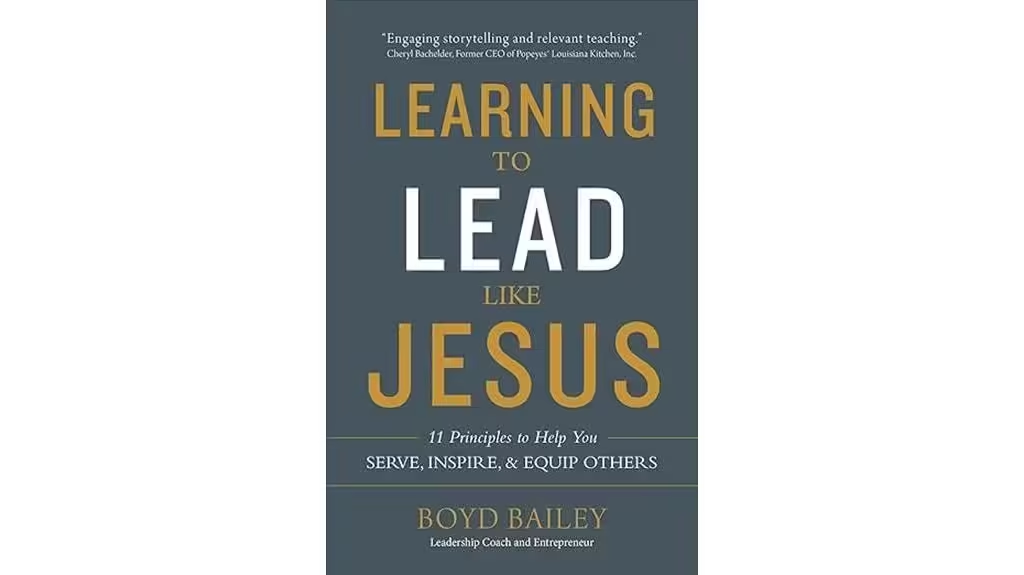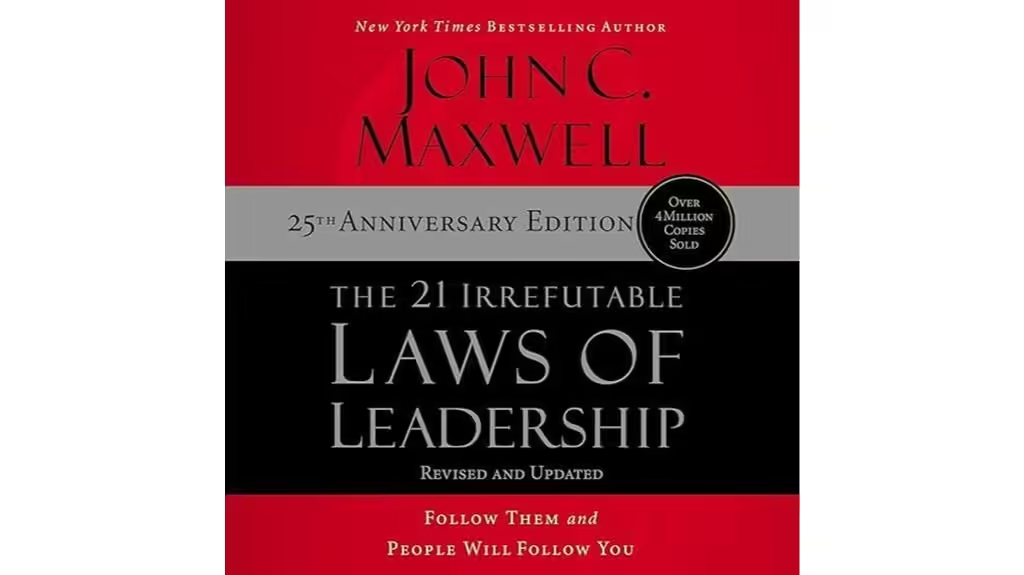If you're looking to inspire and empower your leadership journey, check out these five Christian leadership books. "Learning to Lead Like Jesus" reshapes your approach with practical insights. "The 21 Irrefutable Laws of Leadership" offers timeless principles for effective influence. "Gentle and Lowly" introduces you to the compassionate heart of Christ. "Leaders Eat Last" highlights how prioritizing team well-being fosters trust. Finally, "Dare to Lead" emphasizes vulnerability and authentic connections. Each of these books will enrich your leadership, guiding you toward a more impactful experience. There's much more to explore about these titles and their powerful messages.
Learning to Lead Like Jesus: 11 Principles for Leadership

If you're looking to enhance your leadership skills in a meaningful way, "Learning to Lead Like Jesus: 11 Principles for Leadership" is an outstanding choice for both aspiring and seasoned leaders. This transformative book offers practical insights that can fundamentally reshape how we approach leadership in our personal and professional lives. I found the structure beneficial, taking a day for each chapter to truly absorb the lessons. The writing style is invigoratingly simple yet deeply profound, prompting me to reflect on my own leadership journey. It's particularly impactful for those in ministry, inspiring a renewed commitment to serve others. I highly recommend it for anyone, regardless of faith, seeking to foster genuine connections and lead with integrity.
Best For: Individuals seeking to enhance their leadership skills, especially those in ministry or anyone wishing to lead with integrity and foster meaningful connections.
Pros:
- Offers practical insights that reshape leadership approaches in personal and professional contexts.
- Encourages thoughtful reflection and deeper understanding through its structured chapter format.
- Inspires a renewed commitment to service, making it particularly impactful for those involved in ministry.
Cons:
- May primarily appeal to those with a Christian background, potentially limiting its broader audience.
- Some readers might find the principles too idealistic for real-world applications.
- The simplicity of the writing style may not resonate with those who prefer more complex narratives.
The 21 Irrefutable Laws of Leadership: 25th Anniversary

"The 21 Irrefutable Laws of Leadership: 25th Anniversary" is an exceptional choice for anyone endeavoring to enhance their leadership capabilities, particularly those in Christian contexts. John C. Maxwell offers 21 timeless laws that are practical and applicable in various situations. Each law, from the Law of the Lid to the Law of Legacy, emphasizes key principles like influence, trust, and the importance of serving others. I appreciate how Maxwell includes self-assessment questions at the end of each chapter, prompting me to reflect on my leadership journey. While some content may feel repetitive, the engaging stories and actionable insights make this book a must-read for anyone looking to grow and empower others effectively in their leadership roles.
Best For: Individuals seeking to enhance their leadership skills and effectiveness, particularly in Christian contexts.
Pros:
- Timeless principles that are practical and applicable across various situations.
- Engaging stories that illustrate the laws and make the content relatable.
- Self-assessment questions at the end of each chapter encourage personal reflection and growth.
Cons:
- Some content may feel repetitive and could benefit from more variety.
- Certain areas may lack depth, leaving readers wanting more detailed exploration.
- Context-specific examples may not resonate with all readers, limiting broad applicability.
Gentle and Lowly: The Heart of Christ for Sinners and Sufferers

For anyone seeking a deeper understanding of Jesus's compassionate nature, "Gentle and Lowly: The Heart of Christ for Sinners and Sufferers" is an invaluable resource. Dane Ortlund explores the heart of Christ, emphasizing His gentleness and lowliness, which resonates deeply with our struggles. As I read, I felt encouraged and comforted, often moved to tears by the profound insights. The book beautifully highlights that Jesus's love is unconditional, reminding us that grace abounds even in our sinfulness. With accessible language and rich theological reflections, it's perfect for personal growth or group discussions. I find myself wanting to revisit its pages, knowing each reading brings new layers of understanding of Christ's heart for us.
Best For: Those seeking encouragement and a deeper understanding of Jesus's heart, particularly individuals grappling with personal struggles or looking for community engagement.
Pros:
- Accessible language makes complex theological concepts understandable for all readers.
- Rich theological reflections provide profound insights into Christ's compassionate nature.
- Uplifting content encourages personal growth and fosters meaningful discussions in group settings.
Cons:
- Some readers may find the emotional tone overwhelming at times.
- The focus on Puritan theology might not resonate with everyone.
- A desire for deeper theological analysis could leave some wanting more from the content.
Leaders Eat Last: Why Some Teams Pull Together and Others Dont

Selfless leadership stands out as a key feature of "Leaders Eat Last: Why Some Teams Pull Together and Others Don't," making it an excellent choice for those seeking to inspire and uplift their teams. Simon Sinek emphasizes that leaders should prioritize the well-being of their team members, creating a supportive environment where everyone feels valued. This book resonates particularly with millennials, highlighting the importance of respect and human connection at work. Sinek's insights into biological factors like serotonin and oxytocin reveal how trust and recognition foster a strong company culture. By encouraging leaders to reflect on their styles, this book promotes meaningful engagement, helping teams pull together even in challenging times. It's a must-read for anyone looking to enhance their leadership journey.
Best For: Those seeking to enhance their leadership skills and create a supportive team culture, particularly in environments with younger employees.
Pros:
- Fosters a sense of belonging among team members, leading to increased loyalty and emotional investment.
- Grounded in biological insights, providing a framework for understanding team dynamics and motivation.
- Encourages self-reflection in leaders, promoting continuous improvement in leadership styles.
Cons:
- Some political commentary may detract from the core leadership principles for certain readers.
- Focuses heavily on biological aspects, which may not resonate with all leadership styles or organizational cultures.
- Potentially idealistic, as implementing all suggested practices may be challenging in real-world scenarios.
Dare to Lead: Brave Work. Tough Conversations. Whole Hearts.

Leaders seeking to foster authentic connections and create inclusive environments will find "Dare to Lead: Brave Work. Tough Conversations. Whole Hearts." by Brené Brown invaluable. This book redefines leadership through vulnerability, emphasizing how it can spark innovation and strengthen team dynamics. Brown dives into trust, empathy, and resilience, showing us that tough conversations are essential for growth. I appreciate her practical exercises that encourage self-reflection and help us embrace our vulnerabilities. Each chapter offers actionable steps, making it easy to apply these insights in both professional and personal settings. Whether you're leading a team or nurturing your family, Brown's approach invites us to take responsibility for others' potential, making it a must-read for any aspiring leader.
Best For: Leaders, educators, and anyone interested in fostering authentic connections and inclusive environments through vulnerability and empathy.
Pros:
- Provides practical exercises for self-reflection and personal growth.
- Encourages tough conversations that promote team resilience and trust.
- Engaging writing style makes complex concepts accessible and relatable.
Cons:
- Some readers may find the focus on vulnerability challenging or uncomfortable.
- The book's concepts may require time and effort to fully implement in practice.
- Not all leadership styles may align with Brown's emphasis on emotional openness.
Factors to Consider When Choosing Christian Leadership Books
When you're choosing Christian leadership books, consider the author's background and credibility first. You'll want to look at the core themes and messages they present, as well as how practical the applications are for your own leadership journey. Don't forget to think about the writing style and who the target audience is, as these factors can greatly influence your reading experience.
Author's Background and Credibility
In your quest for impactful Christian leadership books, understanding the author's background and credibility is essential. An author with a solid foundation in theology or ministry can provide valuable insights, ensuring their teachings are rooted in Christian tradition and doctrine. This grounding can enhance your understanding and application of leadership principles within a Christian context.
Look for authors who have experience in leadership roles, whether in church settings or secular environments. Their practical applications of Christian principles in real-world scenarios can be incredibly beneficial as you navigate your own leadership journey.
A credible author often has published works, speaking engagements, or leadership training that showcase their expertise and authority. This track record can give you confidence in the teachings they present. Additionally, consider the impact of their previous books or teachings, as this can indicate their effectiveness in communicating Christian leadership principles.
Core Themes and Messages
A variety of core themes and messages emerge in Christian leadership books, guiding you toward effective practices rooted in faith. One prominent theme is selfless service, reflecting Jesus' teachings on servant leadership. Prioritizing the well-being of others not only builds a strong foundation for your leadership but also fosters a culture of collaboration and support.
Another essential aspect is the emphasis on emotional connection and trust within teams. You'll find that effective leadership is built on relationships, rather than authority alone. Embracing vulnerability is often highlighted as a strength, encouraging you to acknowledge your imperfections and create a safe environment for your team to innovate and take risks.
Additionally, these books integrate biblical truths and principles, reinforcing that your leadership should align with values such as love, grace, and integrity. You'll notice that many authors also focus on practical application, providing exercises and self-reflection questions to aid your personal growth. By considering these core themes and messages, you'll be better equipped to choose the right Christian leadership books that resonate with your journey and empower your leadership style.
Practical Application Opportunities
Selecting the right Christian leadership books involves considering how their principles can be effectively integrated into your unique context, whether it's ministry, family life, or workplace dynamics. Look for books that provide actionable insights and include self-assessment questions at the end of each chapter. These features foster reflective practice and personal growth, allowing you to apply what you learn in real-time.
It's essential to choose resources that emphasize empathy, vulnerability, and trust. These qualities are vital for creating supportive environments in both spiritual and secular leadership roles. Evaluate books that incorporate real-life examples and stories, as they make it easier to relate the teachings to everyday challenges you face as a leader.
Additionally, seek out texts that encourage community engagement through discussion guides or group study formats. This can facilitate shared learning and collective application of the concepts presented, enhancing both personal and group development. By focusing on these practical application opportunities, you'll empower yourself to grow and lead effectively in your specific context, ensuring that the lessons you learn resonate with your journey.
Writing Style and Engagement
When choosing Christian leadership books, consider how the writing style and engagement factors can enhance your learning experience. The writing style can vary considerably, with some authors using simple yet profound language that makes complex theological concepts accessible. This encourages thoughtful reflection and invites you to dive deeper into the material.
Engaging storytelling is another essential aspect. Authors often illustrate key principles through relatable stories, helping you connect personally and enhancing your understanding. Look for books that include actionable steps and reflective questions at the end of chapters; these elements promote active engagement and self-assessment, allowing you to apply lessons to your leadership journey.
The tone of the writing also plays an important role in your engagement. Authors who use warmth and humor create an inviting atmosphere, encouraging you to be open and vulnerable. Finally, books that weave personal anecdotes with research and theological insights tend to resonate more deeply, fostering an emotional connection to the material.
Target Audience Considerations
Understanding your target audience is essential in choosing the right Christian leadership books. First, consider the leadership level of your audience. Are they emerging leaders or seasoned professionals? This distinction will help you select books that align with their experience and expectations. Next, assess the specific context in which they operate—be it ministry, corporate, or community leadership. The relevance of a book's teachings often hinges on this context.
Additionally, identify your audience's spiritual maturity and theological background. Some books dive deep into theological discussions, while others might focus on practical applications. You want to choose something that resonates with their understanding.
Next, think about their preferred learning style. Do they learn best through storytelling, practical applications, or theoretical frameworks? This consideration guarantees that the book engages and resonates with them.
Theological Alignment and Insights
Evaluating the theological alignment of Christian leadership books is crucial for guaranteeing they resonate with your beliefs and the teachings of your denomination. When you choose a book, assess the author's theological framework to confirm it matches your personal convictions. Look for works that incorporate scriptural foundations and references to biblical principles, as these can deepen your understanding and application of leadership within a faith context.
Consider texts that draw from historical theological perspectives, like Puritan theology, which can offer significant insights into contemporary leadership challenges. This historical context can enrich your approach to leadership and decision-making.
Additionally, evaluate whether the book emphasizes core Christian values such as grace, compassion, and servant leadership. These traits are essential for effective ministry and community engagement, so you want to guarantee the material reflects them.
Frequently Asked Questions
What Are the Key Themes in Each Recommended Book?
When exploring key themes in recommended books, you'll notice that leadership often revolves around principles like integrity, service, and vision. You'll find discussions on the importance of humility, the power of faith in decision-making, and the necessity of community. Each book emphasizes personal growth and the impact of leading by example, encouraging you to reflect on your values and how they shape your leadership style in various contexts.
How Do These Books Differ From Secular Leadership Literature?
When you immerse yourself in Christian leadership books, you'll notice they often weave faith and ethics into the fabric of their teachings. Unlike secular literature, which may focus solely on strategy and results, these books emphasize character development, servant leadership, and community. They encourage you to lead with compassion and integrity, nurturing both personal growth and team dynamics. This approach fosters a deeper connection to purpose, guiding you to lead in a more impactful, meaningful way.
Are There Study Guides Available for These Leadership Books?
Yes, there are study guides available for many leadership books, including those from a Christian perspective. These guides often include discussion questions, key concept summaries, and practical applications to help you deepen your understanding and apply the principles in your life. By using a study guide, you can engage more fully with the material, making your learning experience richer and more meaningful. Look for them alongside the books or from online resources.
Can These Books Be Used for Group Discussions or Workshops?
Absolutely, these books are perfect for group discussions or workshops. In fact, studies show that 70% of people learn better in collaborative settings. When you gather with others to explore these texts, you not only deepen your understanding but also foster meaningful connections. You can share insights, challenge perspectives, and grow together. So, don't hesitate to bring these books into your group—it's a great way to enhance everyone's leadership journey!
What Age Groups Are These Books Suitable For?
These books cater to a wide range of age groups. You'll find titles suitable for teens looking to explore leadership principles, as well as those aimed at adults seeking deeper insights. Many authors tailor their messages to resonate with different life stages, ensuring everyone can connect. Whether you're in high school or well into your career, you'll discover valuable lessons that inspire and empower you to lead with confidence and purpose.
Wrapping Up
In your journey of faith and leadership, these five books offer invaluable insights and practical wisdom to inspire you. Each one encourages you to lead with purpose, compassion, and courage. As you explore these teachings, ask yourself: how can you embody the principles of Christ in your leadership style? By embracing these lessons, you'll not only grow as a leader but also uplift those around you, creating a positive impact in your community and beyond.
